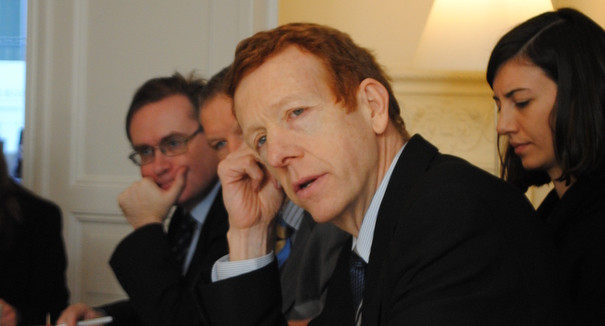Registration
Thank you!
You will receive an email confirming your registration.
IMGXYZ3564IMGZYXDuring a private roundtable in Brussels with a group of European policy makers and senior analysts, Carnegie’s Thomas Carothers discussed his new report Democracy Policy under Obama: Revitalization or Retreat?. The discussion tackled the various challenges and opportunities in the realm of democracy support, ranging from the Middle East and North Africa to Russia, Burma, and beyond. Participants delved into both the U.S. and European viewpoints in an effort to provide a more holistic exploration of the current global landscape.
Democracy Policy Under Obama
- U.S. Politics: Carothers pointed out how problems with the functioning of the U.S. political system are undercutting efforts by the Obama administration to rebuild the credibility of the United States as a positive example of democracy in the world.
- Evolution of Obama’s Democracy Policy: Carothers outlined how the Obama administration’s approach to democracy support has evolved:
- Phase 1: The Obama administration’s initial forays into democracy support were relatively guarded; a response to the previous administration’s democracy track record. During the Bush era, U.S. democracy policy was polarizing and often associated with forcible regime change.
- Phase 2: Seeing that this detached approach may have gone too far, the Obama administration subsequently became more regularly engaged in prodemocracy diplomacy in countries facing political crises, such as Honduras, Cote d’Ivoire, Kenya, and Haiti.
- Phase 3: The Arab Awakening pushed democracy issues higher up on the Obama agenda, though it also underlined the tensions surrounding U.S. interests both in favor of and against democracy in the region.
- Phase 1: The Obama administration’s initial forays into democracy support were relatively guarded; a response to the previous administration’s democracy track record. During the Bush era, U.S. democracy policy was polarizing and often associated with forcible regime change.
Similarities and Differences Under Obama
- Similarities: Carothers pointed out certain aspects of U.S. democracy policy have been consistent across administrations, such as the pattern of presidents assuming office with the intent of de-emphasizing democracy and then being pulled into greater engagement by global events.
- Differences: It is noteworthy that President Obama is one of the first presidents to be interested in the “long game” of democracy support, Carothers said. He defined this as supporting the multilateral framework for democracy by engaging rising democracies, promoting open government, combating corruption, reforming the Community of Democracies, engaging more deeply with civil society abroad, and linking democracy with development goals.
Transatlantic Democracy Support
- Lack of “Transformational Narrative”: Carothers raised the point that the United States no longer has a transformational narrative underlying its foreign policy. The lack of such a narrative undermines the edifice of democracy support, he contended. One participant added that, without a narrative to counter it, the U.S. invasion of Iraq still stands in many parts of the world as the defining moment of U.S. democracy policy.
- Europe’s Narrative: Another participant suggested that the European Union has a tendency to overuse its own narrative and overestimate its attractiveness in its democracy support policies, instead of supporting the narrative of neighboring countries.
- Lack of Implementation: One participant questioned the incentive behind democracy promotion efforts, considering that its ultimate impact is often not tangible. Carothers responded that although the European Union and the United States have no assurance whether their actions have an actual impact, the development and accession hammers as well as an interventionist policy continue to be the essence of the EU and US political approaches, respectively.
- Lack of Infrastructure: The European Union lacks the intellectual infrastructure to fully operationalize democracy support, contended one participant. The participant suggested that Europe also lacks knowledge on the operations and reform practices of countries targeted for democracy support.
- Conditionality in Foreign Policy: There are a number of fundamental problems in using conditionality as a foreign policy tool for democracy assistance, a participant said. For example, it becomes difficult to determine whether conditionality is just a mechanism for channeling additional EU support to countries which are instilling reform, whether it has a real transformational element, or even whether it is just being used as a political tool. Participants agreed that the debate needs to be refocused to tackle questions such as whether more consistency in policy is needed or whether democracy promotion should be accommodated on a case-by-case basis. Carothers stated that the conditionality, or the “more for more” mechanism, that has driven EU foreign policy in response to the Arab Spring has been more relevant to the operationalization of EU democracy promotion than to that of the United States.
